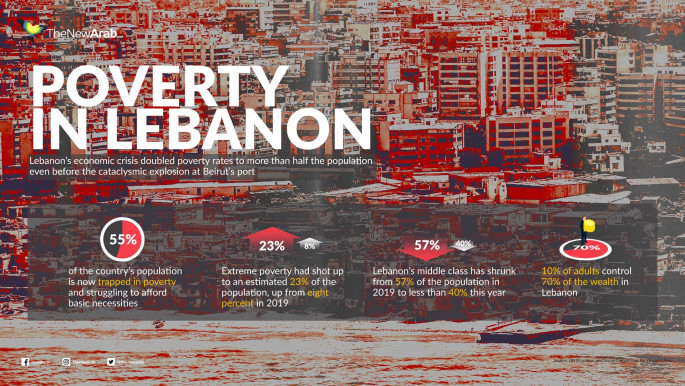Setbacks and subtle victories: One year of Lebanon protests
Lebanon's protest movement has made some important gains since it burst out onto the streets a year ago, even if its revolutionary fever has died down.
Demonstrations that erupted last October 17 over a planned tax on calls made via messaging apps quickly evolved into an unprecedented nationwide uprising against political leaders viewed as inept and corrupt.
Politics in multi-confessional Lebanon is dominated by former warlords from the 1975-1990 civil war who have exchanged their military fatigues for suits, or were replaced by relatives.
The cross-sectarian protest movement initially generated hope of sweeping changes, and less than two weeks later the government resigned under street pressure.
But a grinding economic crisis and measures to stop the spread of the novel coronavirus combined to take the wind out of the "revolution" camp's sails, before a cataclysmic explosion at Beirut's port on August 4 sparked a brief street revival.
The cabinet, in power for just over seven months, resigned over the port catastrophe, and a new government has yet to be appointed.
But activists insist change is underway, even though the traditional ruling class is still firmly entrenched.
Political leaders have been heckled and shamed inside shops and restaurants over the past year, and are aware of the growing tide against them.
"They are afraid of being targeted by demonstrators and have disappeared" from public places, said political scientist Ziad Majed.
He hailed the protest movement for sparking "a change in mentalities" towards a more secular approach to politics, even as Lebanon's confessional system remains in place.
'Accelerating effect'
Since the protests erupted, citizen-powered media initiatives have gained a boost as an alternative to mainstream Lebanese outlets that are mostly funded by or aligned with one of the country's political leaders.
Megaphone, a largely volunteer-run online platform founded in 2017, is among the most prominent.
It was created to counter "the hegemonic media discourse that is controlled by political money or political interest," said Jonathan Dagher, an activist and journalist who volunteers at the organisation.
Some structures that formally operate outside the state's ambit have also started to undergo changes.
The Beirut Bar Association, long controlled by representatives of ruling parties, elected independent candidate and protest sympathiser Melhem Khalaf as its president last November.
The protest movement has also had an impact on policy decisions.
Parliament passed two major anti-corruption laws this year -- a significant move for a body usually mired in political deadlock.
"The protest movement as well as international pressure had an accelerating effect," former MP Ghassan Moukheiber said.
And in a major victory, the World Bank announced last month that it was cancelling a loan to fund a dam in Lebanon that environmentalists and activists said could destroy a valley rich in biodiversity.
Meanwhile, some politicians' rhetoric has clumsily tried to align with the street, largely due to mounting international pressure as they seek a financial bailout for Lebanon to stem its economic crisis.
Threats of Western sanctions against individual players have caused some alarm among the hereditary political class that now ostensibly supports calls for a secular civil state.
Demonstrators have long demanded such a move, railing against a confessional system of politics that distributes posts according to sectarian affiliation.
Revolutions 'take time'
Lebanon's political barons are widely accused of decades of nepotism and corruption, and many blame what they see as incompetence for the August 4 explosion.
Authorities say the blast was caused by a vast stock of ammonium nitrate that caught fire after it languished at the port for years.
After the explosion, protesters hanged cardboard cut-outs of the political elite from mock gallows in a display of rage.
They included an image of Hezbollah leader Hassan Nasrallah -- a gesture almost unthinkable even 12 months ago.
"Revenge, revenge, until this regime reaches an end," protesters chanted.
Politicians largely stayed out of public view in the wake of the blast, avoiding visits to the disaster site or hard-hit neighbourhoods.
International donors who pledged millions in blast aid to Lebanon have said that funds would bypass the government and go directly to the population and to NGOs.
Historian Carla Edde said the movement that began last October marked a "historic turning point".
Revolutionary movements "generally take time" to succeed, but "it is not only a question of time," she warned.
Without a solid leadership that becomes institutionalised in politics, lasting change will remain a pipe dream, she said.
Dagher, the activist and journalist, said the defenders of the cause were aware of the challenge.
"We know the size of the regime we are facing, the size of the monster, we know what we're up against," he said. "It will take time."
Follow us on Facebook, Twitter and Instagram to stay connected





 Follow the Middle East's top stories in English at The New Arab on Google News
Follow the Middle East's top stories in English at The New Arab on Google News


![22 Arab countries at COP29 have rejected the targeting of fossil fuels [Getty]](/sites/default/files/styles/image_330x185/public/2024-11/GettyImages-2184289638.jpg?h=199d8c1f&itok=ptHl5bec)